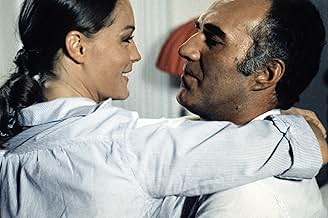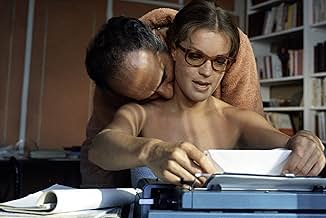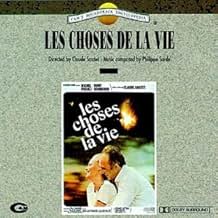PUNTUACIÓN EN IMDb
7,4/10
5,8 mil
TU PUNTUACIÓN
Añade un argumento en tu idiomaA highway engineer is involved in a car crash, after which, near death, he remembers his life leading up to the accident.A highway engineer is involved in a car crash, after which, near death, he remembers his life leading up to the accident.A highway engineer is involved in a car crash, after which, near death, he remembers his life leading up to the accident.
- Premios
- 1 premio y 2 nominaciones en total
Argumento
¿Sabías que...?
- CuriosidadesCigarette count: 46
- PifiasIn the car crash scene, the stunt double for Michel Piccoli is seen wearing brown gloves in close-ups. However Piccoli is bare-handed while driving.
- ConexionesFeatured in Claude Sautet ou La magie invisible (2003)
Reseña destacada
Pierre Bérard is a man in his forties, a lean and attractively masculine architect exuding self-confidence and that nuanced shade of charisma in gray-flannel suits executive display like a second nature.
On a sunny day in the French countryside near Nantes, a lorry full of pigs is caught in the middle of an intersection; blocking the way to Pierre's car coming at full speed, and with a truck coming in the opposite direction, Pierre can't avoid the head to tail, he veers off the road, hits a tree, spins and turns over and over before being ejected on the grass. The accident lasts less than ten seconds but is treated like a longer interval allowing Pierre to recall all the events that preceded it... and also to tell us that real people don't 'go out' with style and only Sautet's artistic license made a truly engaging character out of a rather ordinary man.
Now, there's more than the "whole-life-flashes-before-eyes" trope, more than the brutality of a sudden accient that the magic of cinema can stretch to a long exhausting hour, itself being the result of ten days of shooting, there's more to it. There's a stylistic decision from Claude Sautet that marks one single event with the stamp of human obsession: like the Golden Palm winner of 1966, "Blow-up" and a mysterious picture or the winner of 1974 "The Conversation" with a mysterious recording, the adaptation of Paul Guimard's novel explores an 'act of God' with the hopeless insistence suggesting that something ever went wrong.
The title gives the unique clue, that's only part of the "things of life".
The film opens with an unscrewed wheel rolling like the last remain of a life in motion. Pierre is lying motionless on the grass, his car already burnt up. Cut to Pierre, lying in bed, with Hélène (Romy Schneider), so much younger we suspect she's not the woman with the ring. There's something about Michel Picolli's physique that makes him strangely more appealing than matinee idol Delon, whose movies with Schneider feel designed to attracts younger audiences. Picolli with his receding hairline, his silvery sideburns, his hairy chest and his naturalness makes the relationship somewhat more relatable.
The intentionally unsubtle transition to the first flashback exposes a naked truth about Pierre's life. The whole accident is shown in slow-motion and intercut with events and incidents set before, getting us close enough to his state of mind during the brief lapse of his accident to seize the irony of his whole life: only when he regained control that he was caught off-guard. In the slow-motion parts, you can see in his face a grim look either out of anticipation of pain, or worse, the realization that he had just broken his "Pot of Milk" like La Fontaine's dairymaid.
Picolli dominates the screen, his chemistry with Helene is believable but there's something so 'definite' about their project to leave for Tunis that it doesn't fool us about Pierre's motivation. He's got a life besides Hélène: a job, a friend (Jean Bouise), a gifted son (Gérard Lartigau) who manufactures electronics gadgets and his ex-wife Catherine (Lea Massari). Every ordinary moment has a sort of casual nonchalance, not interesting in the cinematic meaning, the expositional value would even compromise our interest if it wasn't for Piccoli floating above his own arc with a thinly veiled duplicity.
When he takes an old childhood picture from an old relative or when he has an intimate conversation with ex-wife he grows some complicity, it's like the unexpected activation of the subconscious before something dramatic would happen. And so the flashbacks all build up to the moment where he cancels his holidays with Helene, to spend more time with son. He's evasive in his explanations, with the guilt-ridden expression of a man who can't make the fatal move, I could relate to it. The middle-act weakens the characters but humanizes him in the process.
His chain-smoking isn't even a detail, he smokes so much that IMDb's cigarette count on the Trivia page made me laugh (46, by the way). It's not much the addiction but rather the necessity to plug himself to old habits, the unmovable forces that govern his life without hurting anyone but him.
Another scene shows his first encounter with Helene during an auction, outbidding her for such a futile piece of art it leaves no doubt about her status as the trophy girl. Helene becomes the lighthouse illuminating his second youth, shown through romantic outdoors interludes à la "Love Story", all converging toward the tragic intersection and its nihilistic taste bacK.
Life is a series of random events that constitute our arc, the events that prompted Pierre to write a letter, to retract himself for sending it, to make the final choice, Pierre talking to himself and letting the viewers know the contents of his thoughts, all these things don't amount to much when destiny decides to cut short all our goals and projects.
When Pierre is lying on the ground like Rimbaud's "Sleeper of the Valley", his thoughts are internalized, passing the torch to the more traditional voice-over (that might have inspired the final monologue in "Carlito's Way"). Images aren't set in the past but in a future too idealized to be taken at face value. Indeed, when Pierre's imagination starts, his reality is fading out slowly, becoming the subject of morbid curiosity. The show of life goes on with the anticlimactic spectacle of normality: angry drivers, quarreling couples, policemen, doctors, hospitals and all that jazz.
We're never in total control of our lives, and as one of my friends used to tell me, we spend our life writing the past, not the future, or like John Lennon said, "life is what happens while you're busy making plans" or as LaFontaine said:
When I'm alone, I dare the utmost: [...] Diadems rain down on me.
Some chance event then brings me to my senses, And I'm my lowly self again.
On a sunny day in the French countryside near Nantes, a lorry full of pigs is caught in the middle of an intersection; blocking the way to Pierre's car coming at full speed, and with a truck coming in the opposite direction, Pierre can't avoid the head to tail, he veers off the road, hits a tree, spins and turns over and over before being ejected on the grass. The accident lasts less than ten seconds but is treated like a longer interval allowing Pierre to recall all the events that preceded it... and also to tell us that real people don't 'go out' with style and only Sautet's artistic license made a truly engaging character out of a rather ordinary man.
Now, there's more than the "whole-life-flashes-before-eyes" trope, more than the brutality of a sudden accient that the magic of cinema can stretch to a long exhausting hour, itself being the result of ten days of shooting, there's more to it. There's a stylistic decision from Claude Sautet that marks one single event with the stamp of human obsession: like the Golden Palm winner of 1966, "Blow-up" and a mysterious picture or the winner of 1974 "The Conversation" with a mysterious recording, the adaptation of Paul Guimard's novel explores an 'act of God' with the hopeless insistence suggesting that something ever went wrong.
The title gives the unique clue, that's only part of the "things of life".
The film opens with an unscrewed wheel rolling like the last remain of a life in motion. Pierre is lying motionless on the grass, his car already burnt up. Cut to Pierre, lying in bed, with Hélène (Romy Schneider), so much younger we suspect she's not the woman with the ring. There's something about Michel Picolli's physique that makes him strangely more appealing than matinee idol Delon, whose movies with Schneider feel designed to attracts younger audiences. Picolli with his receding hairline, his silvery sideburns, his hairy chest and his naturalness makes the relationship somewhat more relatable.
The intentionally unsubtle transition to the first flashback exposes a naked truth about Pierre's life. The whole accident is shown in slow-motion and intercut with events and incidents set before, getting us close enough to his state of mind during the brief lapse of his accident to seize the irony of his whole life: only when he regained control that he was caught off-guard. In the slow-motion parts, you can see in his face a grim look either out of anticipation of pain, or worse, the realization that he had just broken his "Pot of Milk" like La Fontaine's dairymaid.
Picolli dominates the screen, his chemistry with Helene is believable but there's something so 'definite' about their project to leave for Tunis that it doesn't fool us about Pierre's motivation. He's got a life besides Hélène: a job, a friend (Jean Bouise), a gifted son (Gérard Lartigau) who manufactures electronics gadgets and his ex-wife Catherine (Lea Massari). Every ordinary moment has a sort of casual nonchalance, not interesting in the cinematic meaning, the expositional value would even compromise our interest if it wasn't for Piccoli floating above his own arc with a thinly veiled duplicity.
When he takes an old childhood picture from an old relative or when he has an intimate conversation with ex-wife he grows some complicity, it's like the unexpected activation of the subconscious before something dramatic would happen. And so the flashbacks all build up to the moment where he cancels his holidays with Helene, to spend more time with son. He's evasive in his explanations, with the guilt-ridden expression of a man who can't make the fatal move, I could relate to it. The middle-act weakens the characters but humanizes him in the process.
His chain-smoking isn't even a detail, he smokes so much that IMDb's cigarette count on the Trivia page made me laugh (46, by the way). It's not much the addiction but rather the necessity to plug himself to old habits, the unmovable forces that govern his life without hurting anyone but him.
Another scene shows his first encounter with Helene during an auction, outbidding her for such a futile piece of art it leaves no doubt about her status as the trophy girl. Helene becomes the lighthouse illuminating his second youth, shown through romantic outdoors interludes à la "Love Story", all converging toward the tragic intersection and its nihilistic taste bacK.
Life is a series of random events that constitute our arc, the events that prompted Pierre to write a letter, to retract himself for sending it, to make the final choice, Pierre talking to himself and letting the viewers know the contents of his thoughts, all these things don't amount to much when destiny decides to cut short all our goals and projects.
When Pierre is lying on the ground like Rimbaud's "Sleeper of the Valley", his thoughts are internalized, passing the torch to the more traditional voice-over (that might have inspired the final monologue in "Carlito's Way"). Images aren't set in the past but in a future too idealized to be taken at face value. Indeed, when Pierre's imagination starts, his reality is fading out slowly, becoming the subject of morbid curiosity. The show of life goes on with the anticlimactic spectacle of normality: angry drivers, quarreling couples, policemen, doctors, hospitals and all that jazz.
We're never in total control of our lives, and as one of my friends used to tell me, we spend our life writing the past, not the future, or like John Lennon said, "life is what happens while you're busy making plans" or as LaFontaine said:
When I'm alone, I dare the utmost: [...] Diadems rain down on me.
Some chance event then brings me to my senses, And I'm my lowly self again.
- ElMaruecan82
- 2 may 2021
- Enlace permanente
Selecciones populares
Inicia sesión para calificar y añadir a tu lista para recibir recomendaciones personalizadas
- How long is The Things of Life?Con tecnología de Alexa
Detalles
- Fecha de lanzamiento
- Países de origen
- Idioma
- Títulos en diferentes países
- The Things of Life
- Localizaciones del rodaje
- Rue de Sèvres, Paris 7, París, Francia(Hélène shopping)
- Empresas productoras
- Ver más compañías en los créditos en IMDbPro
Taquilla
- Recaudación en Estados Unidos y Canadá
- 5063 US$
- Recaudación en todo el mundo
- 5063 US$
- Duración1 hora 29 minutos
- Mezcla de sonido
- Relación de aspecto
- 1.66 : 1
Contribuir a esta página
Sugerir un cambio o añadir el contenido que falta

Principal laguna de datos
By what name was Las cosas de la vida (1970) officially released in India in English?
Responde




























